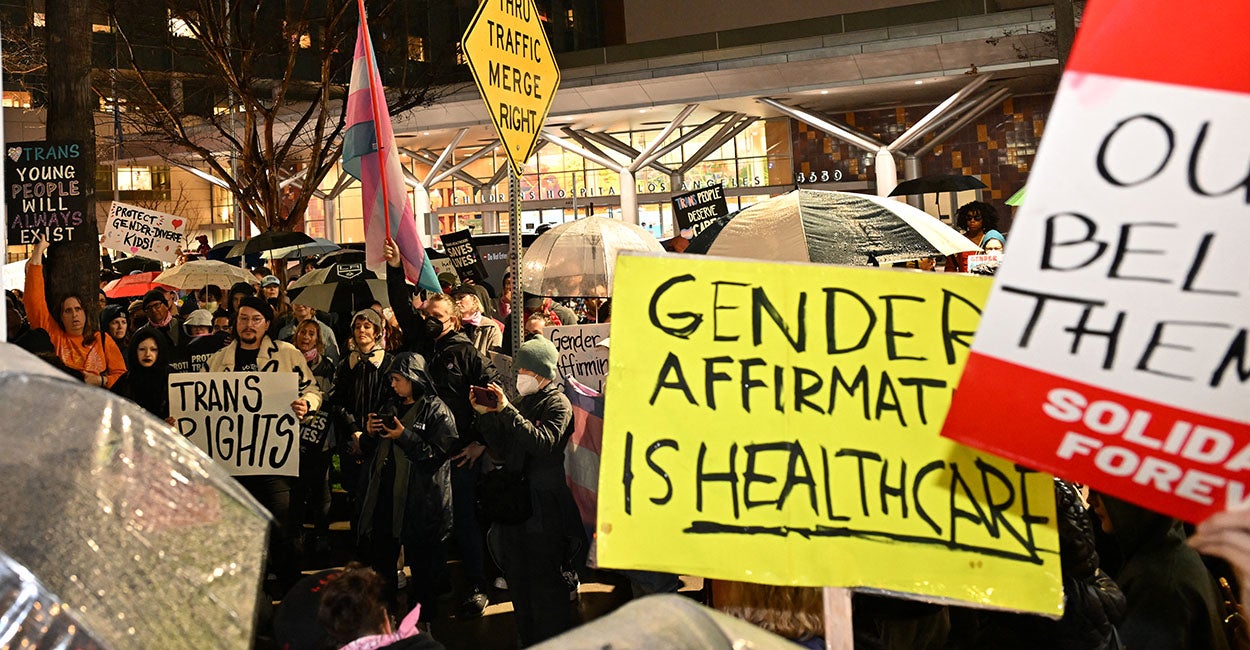
www.dailysignal.com
New HHS Report on Transgender ‘Care’ for Minors Reveals Why Activists Try to ‘Silence Critics,’ Contributor Says
Advocates of transgender medical interventions euphemistically referred to as “gender-affirming care” often seek to silence critics, rather than engaging in a debate on the science—and one of the authors of the Department of Health and Human Services’ report on the issue says he thinks he knows why.
HHS published a review of the evidence regarding medical transition for minors in May, finding “extremely weak evidence” for any benefits from “gender-affirming care.” HHS sought peer review, submitting its report to medical professionals and pro-transgender health associations. Yet two of the three pro-transgender groups HHS approached refused to engage, and the remaining organization appeared not to have read the full report.
The back-and-forth appears in a supplement to the final review, published Tuesday.
“HHS offered the leading organizations advocating for these treatments an opportunity to have their experts participate in a rigorous peer-review process and point out whether the review might have made errors or omissions,” Leor Sapir, a senior fellow at the Manhattan Institute and one of the review’s nine contributors, told The Daily Signal. “As the supplement clearly shows, no such errors or omissions could be identified.”
“Perhaps that’s why advocates of these controversial drugs and surgeries prefer to silence critics and engage in smear campaigns,” he added.
The HHS Review
The HHS review, which President Donald Trump ordered in January, found that most children will grow out of gender dysphoria, the persistent and painful sense of identifying with the gender opposite one’s biological sex.
The review notes that transgender medical interventions “carry risk of significant harms” including sterility, lower bone density, brain impacts, diseases, and more. It laments a lack of research into whether therapy, rather than drugs or surgeries, can manage gender dysphoria.
The review does not present itself as a clinical practice guideline, but it makes the case that experimental “gender-affirming care” likely does more harm than good for minors.
The APA Questions Methodology
HHS reached out to the American Academy of Pediatrics, the American Psychiatric Association, and the Endocrine Society—three organizations that support “gender-affirming care” and had publicly criticized the May review.
The AAP and the Endocrine Society refused to participate, and while the reviewers thanked the APA for submitting a response, they thoroughly dismantled its arguments against the review.
The APA faulted the review’s methodology, but the HHS reviewers noted that APA’s concerns had been addressed in Appendix 4 of the review, which laid out the methodology in great detail. Two non-HHS academics who specialize in methodology also found the HHS review’s practices sound and rigorous.
The reviewers note that APA’s “unfounded criticism may have resulted from a failure to read core parts of the review.”
The APA feedback also listed 16 studies “for review and consideration,” suggesting that the HHS review failed to consider them.
On the contrary, HHS reviewers responded that 12 of the 16 studies had indeed been discussed in the review. Three of the remaining four studies do not pertain to youth outcomes or gender medicine, and the final study had not been published until after the review.
Mistaken Assumptions
APA faulted the HHS review for supposedly failing to examine “potential harms” to minors who do not undergo transgender medical interventions.
The reviewers responded that the research showed “no credible evidence of benefits” from interventions compared with no interventions, and therefore “no credible evidence of harms from not providing” interventions.
Furthermore, the reviewers noted that APA’s claim suggests there’s something inherently wrong with the normal process of puberty, an assumption reviewers reject.
The Cass Review
APA also claimed the HHS review failed to consider certain conclusions of the research published by Dr. Hilary Cass, a pediatrician and former president of Britain’s Royal College of Pediatrics and Child Health, who conducted an extensive 2020 review.
APA quoted a section of the Cass Review stating, “for some, the best outcome will be transition.”
The HHS reviewers said APA had mischaracterized the Cass Review: “When properly understood in context, … the quote is best understood as one consideration in a more nuanced line of clinical reasoning.”
The Cass Review found “weak” evidence for benefits from interventions, and that doctors are unable to determine which minors will persist in a transgender identity.
“Any reasonable interpretation of the Cass Review’s statement that ‘for some, the best outcome will be transition,’ must grapple with its findings about lack of evidence for benefit and deep uncertainties about diagnosis,” the reviewers added.
The State of Transgender ‘Medicine’
A St. Louis University professor, Johan C. Bester, lamented the state of gender medicine in his comment on the HHS review.
He said doctors in the field “appear to have an a priori commitment” to medical interventions. “What came first was certainty that these treatments are beneficial and medically necessary. What came second was seeking for evidence that would justify this proposition after the fact. When no evidence was forthcoming, shifting justifications for treatment emerged.”
Bester lamented that commitment to the interventions became a “litmus test” and a “matter of politics and activism.”
Recent news underscores his observations. The final HHS report comes less than a month after transgender activist pressure led to the revocation of accreditation for a peer-reviewed course on the harms of “gender-affirming care.” Those activists cited the Southern Poverty Law Center, which compares groups of doctors who question “gender-affirming care” to chapters of the Ku Klux Klan.
Transgender advocates will likely demonize the HHS’s final report, but this time they will do so after HHS gave pro-transgender critics the opportunity to respond—and after they largely failed to engage with the material.
Estimated reading time: 5 minutes
The post New HHS Report on Transgender ‘Care’ for Minors Reveals Why Activists Try to ‘Silence Critics,’ Contributor Says appeared first on The Daily Signal.










